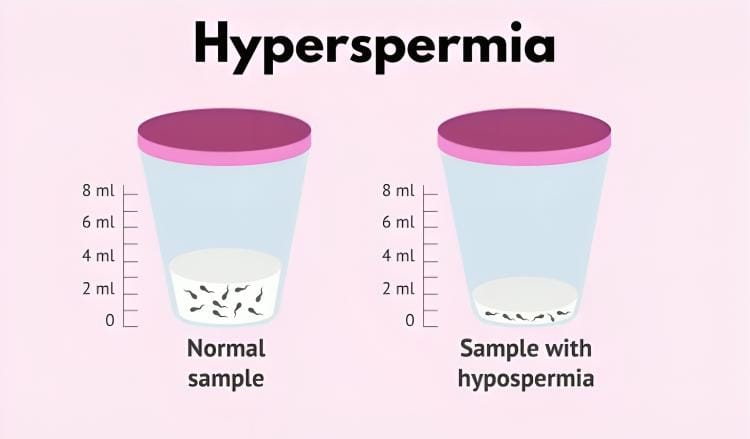Table of Contents
Hyperspermia
In case of male reproductive health we give much attention to conditions like low sperm count or erectile dysfunction. However, there are other less common conditions that can also impact fertility and overall health. One such condition is hyperspermia treatment. This condition is relatively rare, characterized by an abnormally high semen volume.
Must Read: Best Fertility Clinic Delhi, India
What is Hyperspermia?
Hyperspermia is a state in which a man produces big volume of semen while ejaculation. While the average semen volume is typically between 1.5 to 5 milliliters per ejaculation. Men with hyperspermia may produce more than 5 milliliters. Although this might seem like a sign of increased fertility. Hyperspermia can also be associated with less amount of sperm concentration. It directly affect a man’s ability to conceive.
Causes of Hyperspermia
Understanding the causes of hyperspermia is important to diagnosis and treat the condition. The condition can result from various factors. In these factors, some of which are temporary or others may require medical intervention.
- Hormonal Imbalance
One of the primary causes of hyperspermia is a hormonal imbalance. It includes particularly an excess amount of androgens, the male sex hormones. Androgens play a critical role in the regulation of sperm production and semen volume. An imbalance in these hormones can lead to an overproduction of semen.
- Frequent Sexual Activity
Men who engage in frequent sexual activity or have multiple ejaculations in a short period may experience hyperspermia. The body produces more semen in response to increased sexual activity. It can result in larger than normal semen volumes.
- Prostate Health
The prostate gland is responsible for producing a limited portion of the fluid that creates semen. Conditions that affect the prostate, such as benign prostatic hyperplasia (BPH) or prostatitis. It can lead to an increase in semen volume, contributing to hyperspermia.
- Medications and Supplements
Certain medications and supplements that affect hormone levels or increase blood flow to the reproductive organs can cause hyperspermia. For example, some men who take testosterone supplements or medications. This increase libido and may notice an increase in semen volume.
- Lifestyle Factors
Lifestyle factors such as diet, hydration levels, and overall health can also impact semen volume. A diet rich in certain nutrients like zinc and amino acids, or excessive fluid intake. It canleads to hyperspermia in some men.
Hyperspermia Symptoms
- Increased Semen Volume
The most obvious symptom of hyperspermia is the production of an unusually large amount of semen during ejaculation. While this is the primary symptom, it can vary in severity, with some men noticing only a slight increase and others experiencing a significant change.
- Reduced Sperm Concentration
Despite the increased semen volume, men with hyperspermia may have a lower concentration of sperm in their semen. This can affect fertility, making it more difficult for a man to impregnate his partner.
- Longer Ejaculation Time
Some men with hyperspermia report that it takes longer for them to ejaculate due to the increased volume of semen. This can lead to discomfort during sexual activity and may affect sexual satisfaction.
- Potential Fertility Issues
While not all men with hyperspermia will experience fertility issues, those with reduced sperm concentration may find it more challenging to conceive. In such cases, hyperspermia can be a contributing factor to male infertility.
- Physical Discomfort
In rare cases, men with hyperspermia may experience discomfort or a feeling of fullness in the pelvic region due to the increased semen production. This discomfort may be more noticeable after multiple ejaculations in a short period.
Diagnosis of Hyperspermia
- Medical History and Physical Examination
Diagnosing hyperspermia typically begins with a thorough medical history and physical examination. The doctor will ask about symptoms, sexual activity, and any medications or supplements being taken. They will also conduct a physical exam to check for any abnormalities in the reproductive organs.
- Semen Analysis
A semen analysis is the most crucial diagnostic test for hyperspermia. This test measures the volume of semen produced during ejaculation, as well as sperm concentration, motility, and morphology. If the semen volume exceeds 5 milliliters, hyperspermia may be diagnosed.
- Hormone Testing
Hormone levels, particularly testosterone and other androgens. It may be tested to determine if a hormonal imbalance is contributing to hyperspermia. Blood tests can identify unusual levels of these hormones. It might require further investigation or treatment.
- Imaging Tests
In some cases, imaging tests such as ultrasound may be used to examine the prostate gland and other reproductive organs. These tests can help identify any structural abnormalities or conditions like benign prostatic hyperplasia that may be contributing to hyperspermia.
Treatment of Hyperspermia
- Lifestyle Changes
For men whose hyperspermia Treatment is related to lifestyle factors. It makes certain changes may help reduce semen volume. This can include moderating sexual activity, adjusting fluid intake, and making dietary changes to balance nutrient levels.
- Medications
If hyperspermia is caused by a hormonal imbalance. In this case, medications may be prescribed to help regulate hormone levels. This could involve reducing testosterone levels or using drugs that target specific hormones involved in semen production.
- Prostate Treatment
Prostate-related hyperspermia, treating the underlying prostate condition may help reduce semen volume. This could include medications for benign prostatic hyperplasia or prostatitis, or in some cases, surgical intervention.
- Counseling and Support
For men who experience hyperspermia-related discomfort or fertility issues, counseling and support may be beneficial. Speaking with a healthcare provider or therapist can help address any emotional or psychological concerns related to the condition.
- Assisted Reproductive Techniques
IUI or IVF may be recommended that can help bypass the issues related to low sperm concentration in men with hyperspermia.
Conclusion
Hyperspermia is a condition characterized by the production of an unusually large volume of semen during ejaculation. While it is not commonly harmful, hyperspermia can be associated with reduced sperm concentration, which may affect fertility. Understanding the causes, symptoms, and treatment options for hyperspermia is essential for managing the condition and maintaining reproductive health. If you suspect that you have hyperspermia, it is important to consult with a healthcare provider for a proper diagnosis and personalized treatment plan.
Is hyperspermia harmful to my health?
Hyperspermia is generally not harmful to a man’s health. However, it can be associated with reduced sperm concentration, which may affect fertility. If you are concerned about hyperspermia, it is important to consult with a healthcare provider for proper diagnosis and management.
Can hyperspermia be treated?
Yes, hyperspermia can be treated, especially if it is causing discomfort or fertility issues. Treatment options may include lifestyle changes, medications, prostate treatment, and in some cases, assisted reproductive techniques.
Does hyperspermia affect fertility?
In some cases, hyperspermia can affect fertility. Because it leads to reduced sperm concentration in the semen. While the increased semen volume might suggest better fertility, the opposite can be true if the sperm concentration is low. Men with fertility concerns related to hyperspermia should seek medical advice and consider fertility testing.

